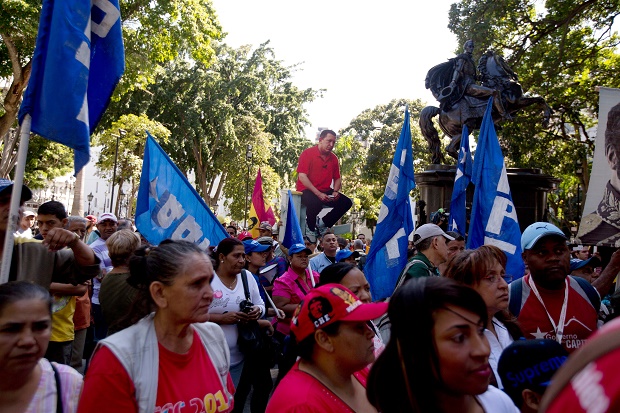Players, strategies in Venezuela’s political crisis

Government supporters gather in Bolivar Square next to a life-size cutout of Venezuela’s late President Hugo Chavez as they protest the removal of the oversized portraits of Chavez and independence hero Simon Bolivar from the National Assembly building, in Caracas, Venezuela, Thursday, Jan. 7, 2016. Venezuela’s opposition took majority control of the National Assembly on Tuesday after years in the political wilderness, setting the stage for a potential power struggle with President Nicolas Maduro. AP Photo
CARACAS, Venezuela—Venezuela plunged into a confusing political deadlock this week. The opposition took control of the country’s legislature but the government vowed to block its reforms.
Here is an analysis of the different players in the institutional standoff, their strategic positions, and hazards in the recession-hit, oil-producing state.
Government
After 17 years in control, President Nicolas Maduro’s socialist PSUV party has lost the National Assembly legislature to the center-right opposition, which is vowing to get rid of him and reform the economy.
But Maduro is seen as holding sway over the Supreme Court, where a legal battle is likely to play out. His side has applied to it to annul the assembly’s reforms.
Article continues after this advertisement“The government has chosen the path of outright confrontation, raising once again the prospect of serious political violence,” wrote Phil Gunson, an analyst with the International Crisis Group.
Article continues after this advertisementMeanwhile skeptics say Maduro’s appointment of socialist hardliners to economic posts in a cabinet reshuffle this week bodes ill for change.
Military
The military could hold the key to resolving deadlock in a country prone to unrest.
The defense minister and head of the armed forces, General Vladimir Padrino, pledged the military’s “absolute loyalty and unconditional support” for Maduro.
READ: Military vows Maduro support in deepening Venezuela crisis
“The armed forces is a complex institution and its behavior in the event of a political crisis of such scale is difficult to predict,” said Diego Moya-Ocampos, a London-based Venezuelan analyst with research group IHS Country Risk.
“The armed forces will play a key role behind the scenes. Crucially they will prevent any confrontation between Venezuelans or between pro-government and opposition groups.”
Opposition
The opposition coalition MUD swore in a two-thirds majority in the assembly after winning December’s elections.
READ: Venezuela opposition sets out to oust government
However Maduro supporters say that “supermajority”—which is large enough to give the opposition the power to launch constitutional measures to oust the president—is not legitimate.
Their claim is based on the fact that the Supreme Court has suspended three opposition lawmakers pending allegations of electoral fraud.
“The institutional crisis between the government and the legislature will escalate further as the MUD and the PSUV struggle to control the Supreme Court,” said Moya-Ocampos.
He said the deadlock will likely cause instability and a worsening of economic hardship for ordinary Venezuelans.
Venezuelan people
December’s vote was widely seen as punishment for the government by an electorate fed up with economic chaos.
“People are hoping their problems will be solved, but if the days go by and things go on like this, social tension will be exacerbated,” said Asdrubal Oliveros, of Venezuelan research group Ecoanalitica.
The plunging price of oil has hit Venezuela’s foreign revenues.
Venezuelans are having to queue for hours to buy rations of cooking oil, toilet paper and other basics.
Domestic worker Gilma Vasquez said she voted to “end the queues.” But in the current deadlock, she says, “I am afraid that nothing will change.”
International community
The United States and Venezuela’s Latin American neighbors are watching closely.
Before the elections the United Nations expressed concern for jailed opposition leaders and the independence of the judiciary.
Long at odds with Maduro and his predecessor Hugo Chavez, Washington has called for a “transparent” resolution.
Maduro’s Venezuelan Foreign Minister Delcy Rodriguez rejected that as “interference.”
The Organization of American States called for “dialogue and peace.” Its leader Luis Almagro warned Maduro against “distorting the voice of the people” after the vote.
“The fact that the opposition was able to achieve a peaceful, democratic change of leadership in the Venezuelan parliament may suggest there is light at the end of the country’s tunnel,” wrote Gunson.
“But for now no one can be sure it is not the headlight of an oncoming train.”